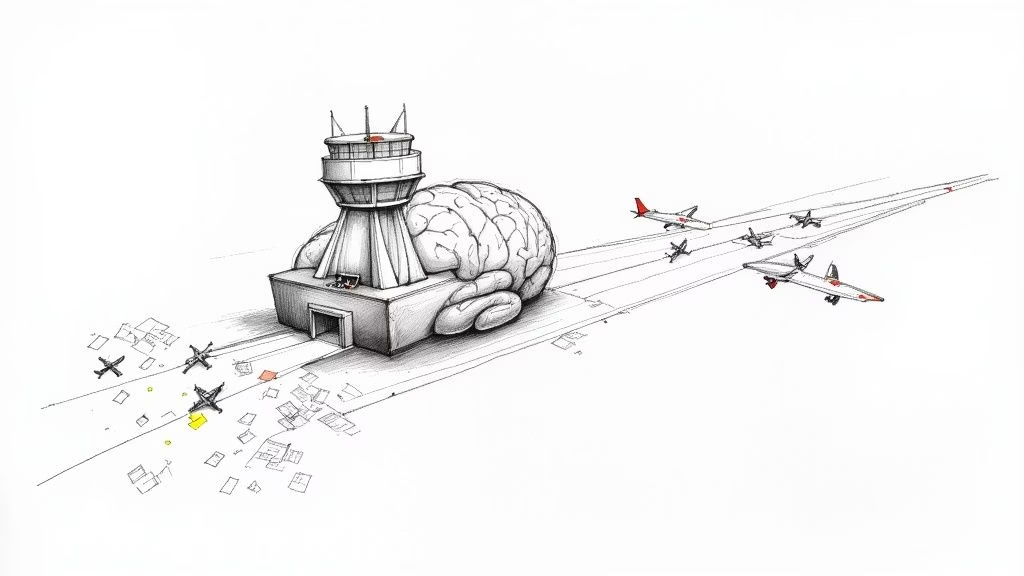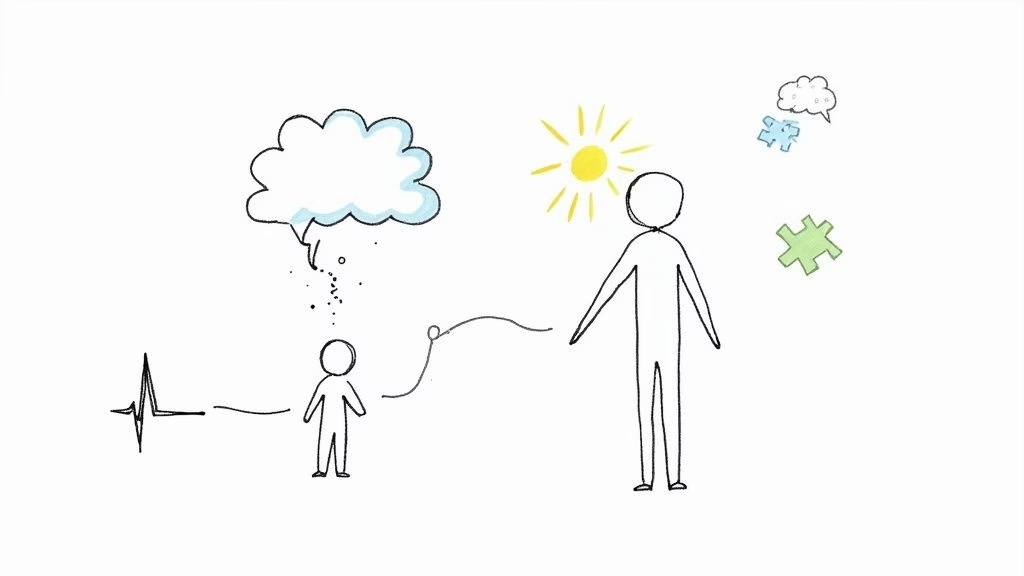So, what exactly is positive psychology?
Put simply, it's the science of what makes life worth living. For a long time, psychology mostly focused on what was "wrong"—mental illness, trauma, and suffering. Think of it as helping someone get from -10 back to 0. Positive psychology picks up where that leaves off. It asks, "How do we get from 0 to +10?"
It’s about moving beyond just feeling "okay" and into a state where we can genuinely thrive and flourish.
A New Focus on Human Strengths
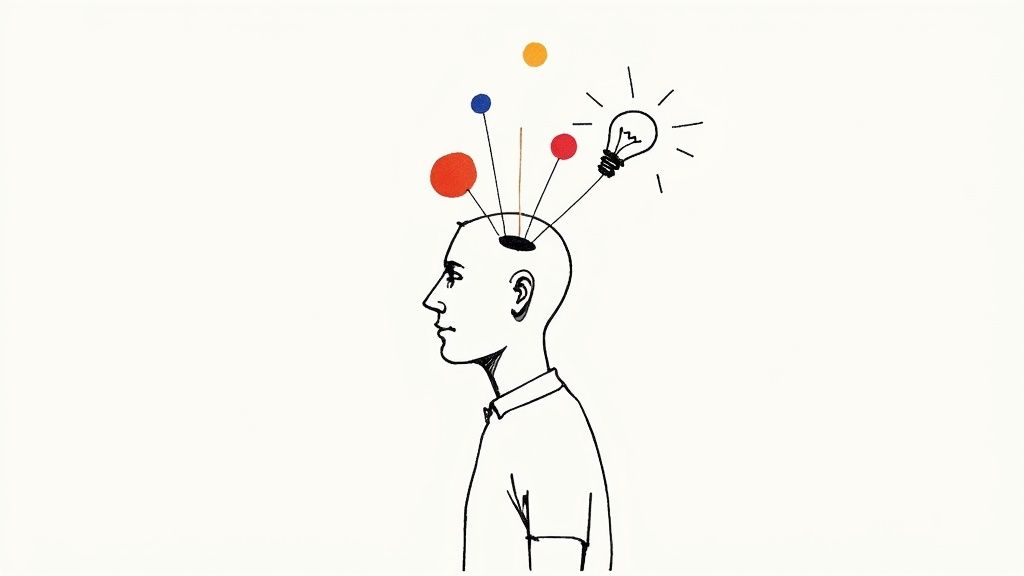
This isn’t about ignoring the tough stuff. Life is full of challenges, and positive psychology doesn't pretend otherwise. Instead, it gives you the tools to face those challenges head-on with a stronger, more resilient mindset.
To put it in perspective, let's look at how this approach stacks up against the more traditional view of psychology.
Positive Psychology vs Traditional Psychology
| Focus Area | Traditional Psychology | Positive Psychology |
|---|---|---|
| Primary Goal | To heal mental illness and alleviate suffering. | To cultivate well-being and personal strengths. |
| View of the Person | Focuses on what's "wrong" or dysfunctional. | Focuses on what's "right" and what works. |
| Starting Point | Moves people from a negative state to neutral. | Moves people from a neutral state to positive. |
| Key Question | "What is broken and how do we fix it?" | "What are your strengths and how do we build on them?" |
As you can see, the two aren't in conflict—they're complementary. One helps us mend, and the other helps us build.
This shift in focus is still pretty new. The field was officially kickstarted in 1998 by Martin Seligman, who was then president of the American Psychological Association. He wanted to steer psychology toward what makes humans strong, and it took off. Research publications jumped from about 70 articles a year in 1999 to over 450 annually by 2021.
Why It's a Game-Changer for Teens
The teenage years are a pressure cooker. You’re juggling academics, friendships, and the massive question of "Who am I?" This is where positive psychology really shines. It provides real-world strategies to build resilience, find motivation, and develop a solid sense of self.
Here's how it makes a difference:
- Tackling Procrastination: It helps you see schoolwork not just as a chore, but as a chance to achieve something meaningful. That shift alone can be a huge motivator.
- Improving Mental Health: By focusing on things you can control—like gratitude, optimism, and identifying your strengths—it creates a powerful buffer against stress and anxiety.
- Strengthening Relationships: It gives you the tools for better communication and empathy, which are crucial for navigating friendships and family life.
A lot of these ideas are connected to the broader concept of understanding what is Social Emotional Learning (SEL), which gives parents and teachers a great framework to work from.
Ultimately, it’s about equipping young adults with the resources to do more than just survive high school. It’s about building a life that feels genuinely meaningful.
Building the Five Pillars of a Flourishing Life
So, what does positive psychology actually look like in real life? It’s more than just a cool theory; it gives us a practical roadmap for building a life that not only feels good but is good. The best framework I've found for this is the PERMA model, created by the pioneer of positive psychology, Martin Seligman.
Think of PERMA as the foundation of a house. For a teen's life to feel stable, strong, and genuinely supportive, all five of these pillars need some attention. It’s not about being perfect in any one area. It’s about building a balanced structure that can hold up against life’s inevitable challenges and create real, lasting happiness.

The 5 Elements of the PERMA Model
The model breaks down a flourishing life into five core ingredients that we can actually work on and cultivate.
- P – Positive Emotion: This isn't just about chasing fleeting moments of happiness. It's about intentionally building up a reserve of good feelings—like gratitude, hope, joy, and optimism—and learning how to savor the good stuff when it happens.
- E – Engagement (Flow): Ever seen your teen so lost in a video game, a sport, or a creative project that they completely lose track of time? That’s "flow." This is all about finding activities that are just challenging enough to hold their attention and use their natural strengths, leading to a deep sense of satisfaction.
- R – Relationships: We’re wired for connection. This pillar is all about the importance of strong, supportive bonds with family, friends, and the community. These are the people who offer love and support and make us feel like we belong.
- M – Meaning: This is that feeling of being part of something bigger than yourself. For a teen, this doesn't have to be some grand, existential quest. It can be found in volunteering for a cause they care about, being a committed member of a team, or even just connecting what they’re learning in school to a future they’re excited about.
- A – Accomplishment: This is about setting and achieving goals—big or small. It’s that feeling of mastery you get from putting in the effort and seeing it pay off. Every little win builds self-esteem and proves to a teen that they are capable and competent.
When teens start to focus on these pillars, they shift from just getting through the day to actively building a life filled with purpose, joy, and resilience.
Putting It All Together for Teens
Once you understand these pillars, you and your teen can start to see where to focus your energy.
Is school motivation tanking? Maybe the answer lies in connecting homework to a bigger Meaning (like a future career) or breaking it down into smaller goals to create a sense of Accomplishment.
If your teen is feeling lonely or isolated, the priority becomes nurturing positive Relationships. It’s a practical diagnostic tool. And for a truly well-rounded approach, exploring how something like neurodiversity affirming therapy can support individual strengths and flourishing is a fantastic step.
Using Positive Psychology to Boost Motivation and Beat Procrastination
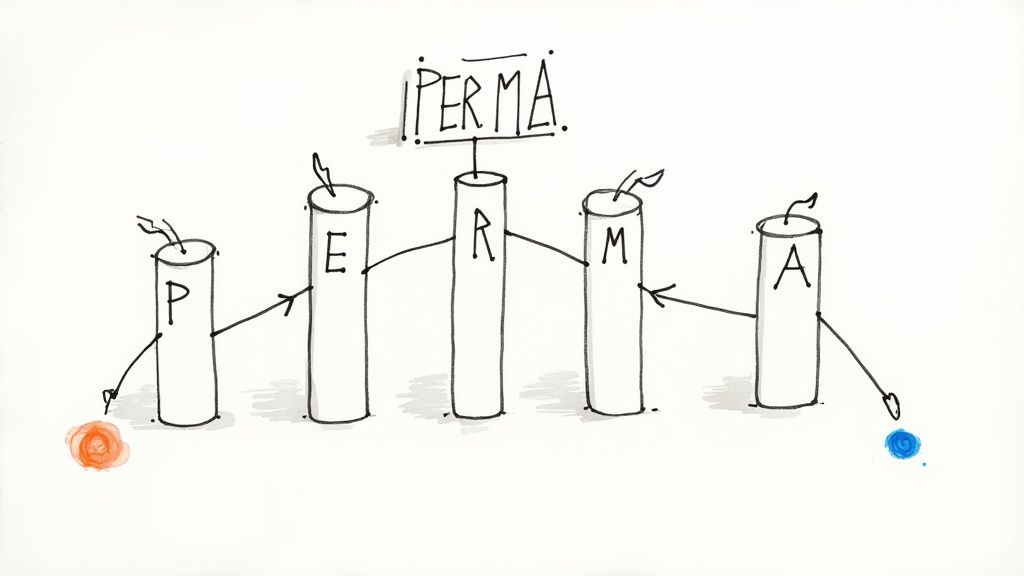
Let’s bring these ideas down to earth and tackle a real-world battlefield for many families: procrastination. When a teen puts off a big school project, it’s rarely about laziness. More often than not, it’s a sign that they're feeling overwhelmed, terrified of failing, or just can’t see the point in the work.
This is where a positive psychology approach can completely change the game. Instead of focusing on missed deadlines and nagging, we can shift the conversation. The real goal is to help them build motivation from the inside out, moving them from a place of avoidance to one of proactive engagement.
From Fixed Mindset to Growth Mindset
A teen stuck in a fixed mindset believes their abilities are set in stone. They're either good at something or they're not, period. So, a tough history paper feels like a threat—a bad grade would just confirm their fear that they’re a "bad writer." This fear is a direct pipeline to procrastination.
On the flip side, a growth mindset sees challenges as a chance to get better. That same paper isn’t a final judgment; it’s just practice. It’s an opportunity to improve.
Here are some parenting tips to help them make that shift:
- Praise the Process, Not the Outcome: Ditch the "You're so smart for getting an A!" Instead, try, "I was so impressed with how you pushed through that difficult chapter." This teaches them that effort is what truly counts, not just innate talent.
- Reframe Setbacks as Learning Moments: When they struggle, don't rush to fix it. Help them see it as part of the process. Ask questions like, "What could you try differently next time?" This makes it normal to mess up and builds real resilience.
Building Motivation and Meaning
To actually beat procrastination for good, the work has to feel like it matters. This is where we can use the PERMA model to inject a sense of Accomplishment and Meaning into their school life.
The secret to motivation isn't a bigger punishment or a flashier reward. It's creating a sense of purpose and progress—turning a mountain of work into a series of small, achievable hills.
Break down that overwhelming project into tiny, manageable steps. Just completing a single outline or writing one paragraph delivers a small hit of Accomplishment, which makes it so much easier to keep the momentum going.
At the same time, try to connect their schoolwork to what they actually care about. If they love video games, an essay on storytelling in games suddenly has way more Meaning than some abstract assignment. By linking their tasks to their own values and interests, you help them find their own reasons to start.
The skills needed here—like planning, prioritizing, and just getting started—are all tied to executive functioning. If you want to go deeper on this, it's worth learning more about what is executive functioning and the huge role it plays in a student's success.
A Simple Meditation Guide for Teens
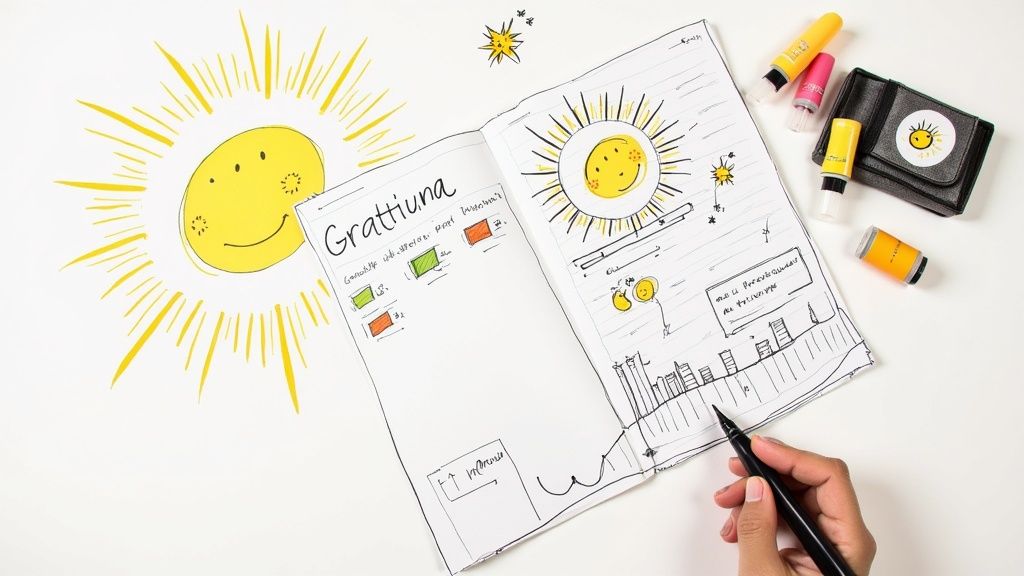
Stress seems to be a constant for teenagers today. The pressure comes from everywhere—school, friendships, and the huge weight of future expectations. But positive psychology offers a powerful, incredibly practical tool for managing it all: mindfulness through meditation.
Forget the idea that this is some complicated spiritual practice. Think of it more like a workout for your brain. It's a way to train your focus, calm down your body’s internal alarm system, and just hit the reset button when everything feels like too much.
This isn't about trying to force an empty mind. That's impossible. It's about learning to pay attention to the present moment, right here and now, without judging it. Research even shows that short mindfulness exercises can lower cortisol (the stress hormone) and sharpen concentration. This makes it a perfect strategy for handling everything from pre-exam jitters to the mental burnout that leads to procrastination.
A Quick Two-Minute Breathing Exercise
When your teen is feeling overwhelmed, this simple practice can be a game-changer. It’s a quiet, private tool they can use literally anywhere, anytime.
- Find a Comfortable Spot: Sit up straight in a chair, with both feet flat on the floor, or lie down.
- Focus on Your Breath: Gently close your eyes. Just pay attention to the feeling of the air coming in through your nose and out through your mouth. Notice your stomach rising and falling.
- Acknowledge Distractions: Your mind will wander. That’s what minds do. When it happens, don’t get frustrated. Just gently guide your focus back to your breath.
- Finish with Intention: After a couple of minutes, slowly open your eyes. Take a moment to notice how you feel before jumping back into your day.
This simple act interrupts the stress cycle. It gives the brain a much-needed break and makes it easier to get back to schoolwork with a clear head. For a deeper dive, our guide on meditation for teens has more techniques to help build this skill.
Resources for Struggling Teen Boys and Young Men
Let's be honest: society puts a lot of pressure on teen boys. There's an unspoken rule that you have to be tough, handle everything on your own, and never show that you're struggling. Talking about your feelings? Forget it.
But a core idea in positive psychology is that recognizing and dealing with your emotions is a sign of strength, not weakness. As parents, we can help build this strength by creating a home where it’s safe to talk about more than just grades or the game last night. We can ask open-ended questions about how our sons are really doing—about their friendships, their worries, their wins.
When parenting teen boys, try to celebrate their character strengths—like their perseverance when a class gets tough, or their integrity when they do the right thing. This builds a deep, unshakable resilience and shows them their value isn't just tied to what they achieve. It also models that being vulnerable enough to admit you're struggling is a courageous and healthy thing to do.
True strength isn't about never feeling overwhelmed; it's about having the courage to face challenges and seek support. Positive psychology provides a framework for building this inner resilience, one conversation at a time.
Where to Find Support for Young Men
Finding the right resources can be a game-changer. Thankfully, there are some fantastic organizations out there dedicated to helping teen boys and young men navigate mental health in a way that actually connects with them.
Here are a few places to start:
- HeadsUpGuys: This is a great resource that offers practical tips, no-nonsense info about depression, and real stories from guys who've been there. It does a fantastic job of breaking down the stigma.
- The Jed Foundation (JED): The Jed Foundation provides a ton of research and resources for teens on managing anxiety, school pressure, and stress. Their articles are easy to digest and give you actionable things you can do right away.
- Men's Groups: Whether it's a local group or an online community, these can provide a powerful sense of belonging. They offer a space for young men to share what's on their mind and learn from others in a supportive, judgment-free zone.
If you want to go deeper into the specific challenges boys are up against, exploring the connection between teen boys' mental health and the need for real-world mentorship offers some valuable perspective.
Got Questions? We've Got Answers
Let's tackle some of the common questions that come up when parents and teens first dive into positive psychology.
Is This Just About Being Happy All The Time?
Not at all. And that’s a huge misconception. A big part of understanding what is positive psychology is knowing it’s not about slapping a smile on and ignoring the tough stuff. Life is full of ups and downs, and feelings like sadness or anxiety are totally normal.
Instead of pretending they don't exist, positive psychology gives you real tools—like a quick meditation guide for teens—to navigate those feelings without letting them take over. It’s about building the resilience to bounce back, not pretending you never get knocked down.
How Can I Help My Teen with Motivation and Procrastination?
This is where positive parenting tips really shine. The goal is to shift the focus from the outcome (the A+ on the test) to the journey—celebrate their effort and the work they put in, regardless of the final grade.
You can also help them find a personal connection to their schoolwork. When an assignment ties into something they genuinely care about, that internal drive—intrinsic motivation—kicks in. For those massive, overwhelming projects, break them down into tiny, manageable steps. Each small win builds momentum and chips away at the fear that so often fuels procrastination.
What Resources Are Available for Teen Boys?
It’s no secret that many teen guys find it tough to open up, which makes finding the right kind of support so important. The good news is, there are some incredible resources out there designed to create safe spaces for young men to talk, listen, and learn.
- Online Communities: Websites like HeadsUpGuys are a great starting point. They offer articles and no-nonsense advice specifically for young men navigating stress and mental health.
- Men's Groups: Whether it's a local group or an online community, these spaces help teen boys connect with others and see that being vulnerable isn't a weakness—it's a sign of real strength.
- The Jed Foundation (JED): This organization, known as JED, is fantastic. It provides a ton of mental health resources, research, and support geared directly toward teens and young adults, helping them handle the pressures of school and life.
These resources can offer a non-judgmental place for teen boys and their families to get the guidance they need.
At Andrew Petrillo Life Coaching, we give teens the tools to push through academic roadblocks, dial down the stress, and build confidence that actually lasts.
If you see your teen struggling with motivation or getting stuck in a cycle of procrastination, let’s talk. Book a complimentary discovery call to see how one-on-one coaching can make a real difference.

















